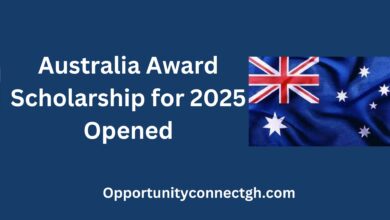Scholarships to Study in Canada in 2024

Introduction
Rising Interest Among Ghanaian Students
The increasing attraction of Canadian universities to Ghanaian students, especially with the availability of scholarships to study in Canada in 2024, is a notable trend. Canada’s appeal lies in its high-quality educational system, a multicultural environment, and immigrant-friendly policies. Each year sees a rise in Ghanaian students choosing Canada for higher education, reflecting a wider global interest in what Canadian institutions have to offer academically. This movement is further boosted by the growing availability of scholarships aimed specifically at Ghanaian students, facilitating their access to Canadian education.
The Role of Scholarships
Scholarships serve as a critical gateway, particularly for Ghanaian students, opening up previously inaccessible opportunities due to financial limitations. They act as a vital key, unlocking the potential for these students to receive a top-tier education in Canada. Covering essential costs like tuition, living expenses, and in some cases, travel, these scholarships significantly reduce the financial burden. Consequently, the aspiration of studying abroad transitions from a mere dream to a tangible and achievable reality. This financial support plays a transformative role in shaping the educational journeys of many students.
Blog Overview
 Embarking on this journey, our blog delves deep into the realm of scholarships available to Ghanaian students eyeing a future in Canadian educational institutions in 2024. We navigate through an array of scholarships, spanning from fully-funded options to those offering partial aid. Along the way, you’ll discover key eligibility requirements, the intricacies of the application process, and crucial deadlines. Our mission is to offer a detailed and user-friendly guide, aimed at steering you towards a fruitful scholarship application. Covering academic levels from undergraduate to postgraduate, including specialized fields, this blog is designed to be your essential resource. Join us as we unravel these opportunities, streamlining your path to achieving a Canadian education.
Embarking on this journey, our blog delves deep into the realm of scholarships available to Ghanaian students eyeing a future in Canadian educational institutions in 2024. We navigate through an array of scholarships, spanning from fully-funded options to those offering partial aid. Along the way, you’ll discover key eligibility requirements, the intricacies of the application process, and crucial deadlines. Our mission is to offer a detailed and user-friendly guide, aimed at steering you towards a fruitful scholarship application. Covering academic levels from undergraduate to postgraduate, including specialized fields, this blog is designed to be your essential resource. Join us as we unravel these opportunities, streamlining your path to achieving a Canadian education.
Why study in Canada?
Canada’s Education System and Global Standing
Canada’s education system is world-renowned for its excellence. Canadian universities consistently rank highly in global university rankings. They are recognised for their research and innovation. Canada invests heavily in education, ensuring quality teaching and advanced facilities. This commitment to education reflects in the graduates they produce, who are sought after globally.
Benefits for Ghanaian Students
Cultural Diversity: Canada is a mosaic of cultures, offering a welcoming environment for international students. Ghanaian students experience a multicultural society, enhancing their global understanding and tolerance. This diversity extends to campuses, providing a rich cultural exchange.
Quality of Life: Canada is known for its high standard of living. It offers a safe, clean, and friendly environment. Students enjoy access to excellent healthcare, public transport, and a range of recreational activities. Canadian cities, like Toronto and Vancouver, are regularly listed among the best places to live in the world.
Educational Opportunities: Canadian universities offer a wide range of programmes. These cater to various interests and fields of study. The education system is flexible, allowing for tailored learning experiences. Work-study options and co-op programmes are available, offering practical experience and career readiness.
Understanding Scholarships
What are scholarships?
Scholarships play a pivotal role in democratizing education by providing financial aid to students, especially those facing economic constraints. These awards, distinct from loans, require no repayment. They acknowledge and foster academic brilliance, unique talents, or special interests. The 2024 scholarships for studying in Canada cover various educational expenses, including tuition, textbooks, and sometimes living costs. This assistance significantly lightens the financial load of education, paving the way for broader academic pursuits.
Types of Scholarships
- Fully-Funded Scholarships: These cover all educational expenses, including tuition, living costs, and sometimes travel. They offer complete financial support for the duration of the study programme.
- Partial Funding Scholarships: These provide a portion of the needed funds. They may cover specific costs, like tuition fees, or offer a fixed amount to assist with various expenses.
- Tuition Waivers: These scholarships specifically cover tuition fees. They do not provide cash but reduce or eliminate the cost of tuition.
- Merit-Based Scholarships: Awarded based on academic excellence, these scholarships recognise outstanding academic achievements.
- Need-Based Scholarships: These are offered to students who demonstrate financial need. They aim to ensure that financial challenges do not hinder talented students from pursuing education.
- Specific Scholarships: Some scholarships target specific groups, like women, minorities, or students pursuing particular fields of study.
General Eligibility Criteria for Scholarships
- Academic Excellence: Many scholarships require a certain level of academic achievement, often demonstrated through GPAs or standardised test scores.
- Financial Need: For need-based scholarships, applicants must often prove their financial situation.
- Special Talents or Interests: Scholarships may be available for unique skills, hobbies, or interests in areas like sports, the arts, or community service.
- Field of Study: Some scholarships are specific to certain fields of study or research areas.
- Community Involvement: Active participation in community service or extracurricular activities can be a requirement.
- Leadership Qualities: Demonstrated leadership skills can be crucial for certain scholarships.
- Personal Essays and Interviews: Applicants may need to submit essays or undergo interviews to articulate their goals, motivations, and how the scholarship will aid their education.
- Letters of Recommendation: Scholarships often require recommendations from teachers, mentors, or community leaders to vouch for the candidate’s qualifications and character.
Top Scholarships for Ghanaian Students
Scholarship 1: Canadian Commonwealth Scholarship Programme
Description: This programme is designed to facilitate students from Commonwealth countries, including Ghana, to pursue advanced studies in Canada.
Benefits: Covers travel, living expenses, and tuition fees for a specified period.
Eligibility: Must be a citizen of a Commonwealth country, possess a minimum of an upper second-class honours degree, and be proficient in English or French.
Application Process and Deadlines: Apply through the Canadian diplomatic missions in Ghana. Deadlines vary annually.
Scholarship 2: Vanier Canada Graduate Scholarships
Description: Aimed at doctoral students, the Vanier CGS attracts and retains world-class doctoral students in social sciences and humanities, natural sciences, and/or engineering and health.
Benefits: It offers CAD 50,000 per year for three years.
Eligibility: Open to Canadian citizens, permanent residents of Canada, and foreign citizens.
Application Process and Deadlines: Applicants need to submit their applications through a Canadian institution with a quota where they intend to study. Deadlines typically fall in November.
Scholarship 3: University of Manitoba Graduate Fellowships
Description: The University of Manitoba provides fellowships to graduate students engaged in full-time graduate studies.
Benefits: The fellowships are valued at CAD 18,000 for Ph.D. students and CAD 14,000 for Master’s students for a 12-month period.
Eligibility: Students of any nationality are eligible to apply.
Application Process and Deadlines: Apply through the University of Manitoba’s application system. Deadlines vary by department.
Scholarship 4: Ontario Graduate Scholarship (OGS) Programme
Description: The OGS Programme encourages excellence in graduate studies at publicly-assisted universities in Ontario.
Benefits: The scholarship offers CAD 5,000 per session. Thus, students may receive CAD 10,000 for two consecutive sessions or CAD 15,000 for three consecutive sessions.
Eligibility: Applicants must have a valid study permit and plan to enrol full-time in a graduate degree programme.
Application Process and Deadlines: Applications are made to the school’s graduate studies department. Deadlines are typically in October.
Scholarship 5: University of Toronto Lester B. Pearson International Scholarship
Description: The scholarship recognises international students who demonstrate exceptional academic achievement and creativity.
Benefits: Covers tuition, books, incidental fees, and full residence support for four years.
Eligibility: international secondary school students intending to begin university studies.
Application Process and Deadlines: Students need to receive a nomination from their school and submit their application for undergraduate studies at the University of Toronto. Typically, schools must nominate by November, and students should complete their scholarship applications by January.
Scholarship 6: Pierre Elliott Trudeau Foundation Scholarships
Description: For doctoral candidates pursuing research in the humanities and social sciences.
Benefits: CAD 40,000 per year for three years, plus a travel allowance.
Eligibility: Open to Canadian and foreign nationals applying to a doctoral programme in the social sciences and humanities.
Application Process and Deadlines: Apply through participating Canadian universities; deadlines vary.
Scholarship 7: Banting Postdoctoral Fellowships
Description: These fellowships provide funding to postdoctoral applicants, both nationally and internationally, who will contribute to the country’s economic, social, and research-based growth.
Benefits: CAD 70,000 per year for two years.
Eligibility: Applicants must fulfil or have fulfilled all degree requirements for a Ph.D.
Application Process and Deadlines: The application deadline is usually in September.
Scholarship 8: Canadian Rhodes Scholarships
Description: The Rhodes Scholarship, a highly prestigious international award, recognizes and supports exceptional students globally for their studies at the University of Oxford.
Benefits: Covers all university and college fees, a personal stipend, and one economy class airfare to Oxford at the start and end of the scholarship.
Eligibility: Students must be aged between 19 and 25, with a strong academic background.
Application Process and Deadlines: Apply online through the Rhodes Trust’s website. Deadlines vary by country.
Scholarship 9: University of British Columbia Scholarships for International Students
Description: UBC provides merit-based scholarships for international undergraduate students.
Benefits: Varies, with some scholarships covering the full cost of tuition and living expenses.
Eligibility: Open to international students on a Canadian study permit.
Application Process and Deadlines: Apply through UBC’s online application system. Deadlines typically occur in January.
Scholarship 10: McGill University Scholarships and Student Aid
Description: Offers a range of scholarships and financial aid for international students.
Benefits: Various, including full and partial scholarships.
Preparing for Life in Canada
Cultural Adaptation and Community Engagement
- Embracing Cultural Diversity: Canada is known for its multicultural society. It’s important to be open to diverse cultures and customs. Engage in cultural exchange activities to enrich your understanding of Canadian society.
- Language Skills: English and French are Canada’s official languages. Although English is widely spoken, picking up some French can be advantageous, particularly in areas like Quebec.
- Social Norms and Etiquette: It’s important to acquaint yourself with Canadian customs, including the importance of being polite, on time, and respecting others’ personal space and privacy.
- Community Engagement: Participate in local events and activities. This can include volunteering, joining clubs, or attending community gatherings, which is a great way to meet new people and integrate into the community.
Overview of Student Life in Canada
- Academic Environment: Canadian universities are known for their emphasis on research and independent learning. Be prepared for a mix of lectures, tutorials, and self-study.
- Campus Resources: Utilise campus resources like libraries, study groups, and career centres. Most universities also offer counselling services and academic advice.
- Work Opportunities: As a student, you may have the opportunity to work part-time. Understand your work permit terms and explore on-campus job options.
- Recreation and Leisure: Canadian universities offer various recreational activities. Participating in sports, the arts, and other clubs can be a great way to relax and make friends.
Resources and Support Systems for Ghanaian Students in Canada
- Student Associations: Look for Ghanaian student associations at your university. These groups provide a platform for networking, cultural exchange, and support.
- Community Groups: Connect with Ghanaian community groups outside campus. They can be a valuable resource for social support and networking.
- Mentorship Programmes: Some universities and organisations offer mentorship programmes to help international students adjust to life in Canada.
- Academic Support: Utilise academic support services provided by your institution, such as tutoring, writing centres, and workshops.
Additional Resources
- Scholarship Websites and Application Portals:
[Canadian Scholarships Portal] (https://www.scholarships.gc.ca/)
– [EduCanada](https://www.educanada.ca/)
- Contact Information for Canadian Universities and Ghanaian Educational Advisors:
List of Canadian Universities: [Universities Canada](https://www.univcan.ca/universities/member-universities/)
Ghanaian Educational Advisors: Contact the Ghanaian Ministry of Education for a list of approved educational advisors.
- Online forums or communities for prospective students:
[Canada Visa Forum] (https://www.canadavisa.com/canada-immigration-discussion-board/)
[Students in Canada] (https://www.studentsofcanada.com/)
Conclusion
Preparing for life in Canada as a student involves cultural adaptation, understanding the academic environment, and engaging with the community. Utilise the resources and support systems available to ease the transition. Canada’s diverse and inclusive society offers a rich environment for personal and academic growth.




